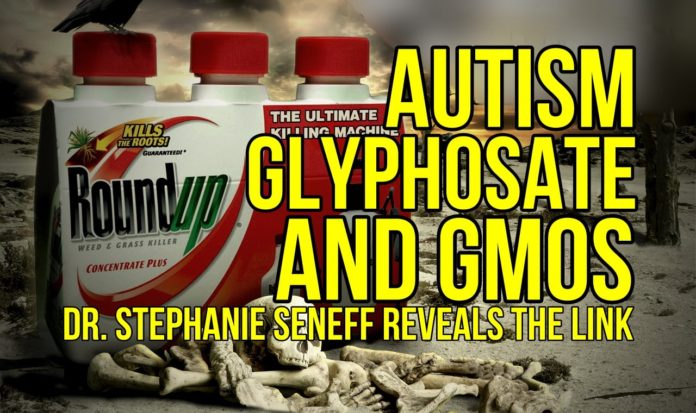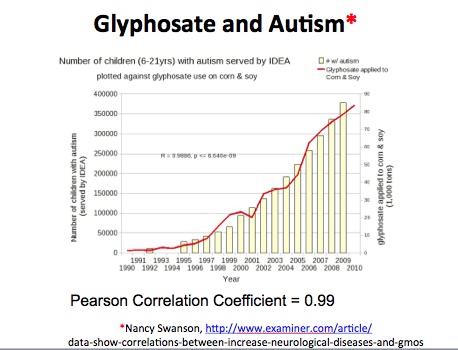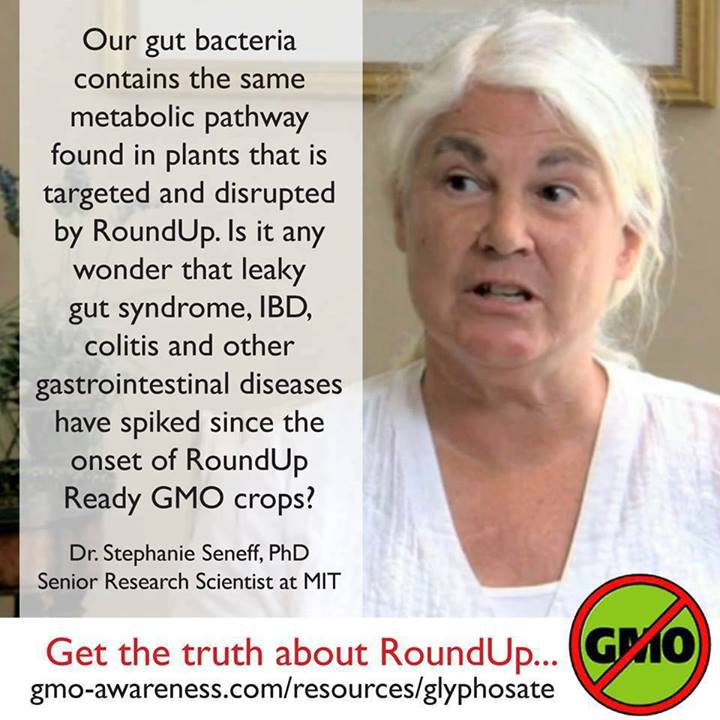
A frightening prediction for our children has been made by a MIT research scientist. Stephanie Seneff, has spent almost a decade studying autism, and the trends and potential causes of the problem now facing today’s parents. Her recent presentation, though controversial, has included the plausibility that by 2025, one out of two children would be born with autism within the United States.
The main body of evidence, she says, points to the increase of the use of Monsanto’s weed killer Roundup, and the active ingredient glyphosate. Seneff is careful to explain that other heavy metal exposure is a contributive factor, but since the heavy use of Roundup in 1990, there has been a steady increase in the development of autism, suggesting a direct correlation to the pesticide and our children’s developmental ability. [1]
However, since the report has circulated, there is also a school of thought aiming to debunk Seneff, stating that her conduct is “bad science,” and that her expertise is not in autism but in computer science.[2] However, what rests in her computer science is the study of human nature and the effects that the modern world has on it, which ultimately aids in efforts to recreate artificial intelligence. Read between the lines and Seneff is applying her PhD and background to think outside the box, and return to her academic roots, biology.
“In recent years, Dr. Seneff has focused her research interests back towards biology. She is concentrating mainly on the relationship between nutrition and health. Since 2011, she has written over a dozen papers (7 as first author) in various medical and health-related journals on topics such as modern day diseases (e.g., Alzheimer, autism, cardiovascular diseases), analysis and search of databases of drug side effects using NLP techniques, and the impact of nutritional deficiencies and environmental toxins on human health”.[3]
The reality is where there is one opinion there will always be another, and this is healthy. The importance is to understand both sides of the argument, and in this case, if Dr Seneff is only half correct, then by 2025, we’ll have a problem of mass proportions involving our children, our future, and overall well-being.
You want to support Anonymous Independent & Investigative News? Please, follow us on Twitter: Follow @AnonymousNewsHQ
[1] Fogeison-Teel, M. (2014). MIT Scientist links autism to Monsanto’s Roundup and predicts HALF of U.S. children will be autistic by 2025. Retrieved from http://www.inhabitots.com/mit-scientist-links-autism-to-monsantos-roundup-and-predicts-half-of-u-s-children-will-be-autistic-by-2025/
[2] Orac. (2014). Oh, no! GMOs are going to make everyone autistic! Retrieved from [ScienceBlog] http://scienceblogs.com/insolence/2014/12/31/oh-no-gmos-are-going-to-make-everyone-autistic/
[3] Seneff, S. (2015).Retrieved from [WebPage] http://people.csail.mit.edu/seneff/







This is crazy. The vast majority of science states that glyphosphate is not harmful. But more importantly, stop conflating Genetic Modification, Monsanto, and Glyphosphate. Monsanto controls only 30% of the seed market, making them only the second largest seed company, so stop acting like they’re the global dominating power. Also, their company is roughly the same size as Whole Foods – interesting comparison, right? But third and perhaps most importantly, pesticides and GMOs are not the same. Condemning GMOs because you don’t like pesticides is like condemning blenders because you don’t like coal power plants – it makes no sense. So please, stop acting like Monsanto = GMO, stop confusing different scientific issues, and stop spreading discounted pseudoscience.
The anti GMO fear mongering is frightening. Don’t people realize that glyphosate is less toxic than table salt and it is FAR less toxic than the herbicides it replaced (many of which are still being used in organic farming). Anyone who has followed this issue knows that the Seneff study was debunked rather strenuously.
“The reality is where there is one opinion there will always be another, and this is healthy.”
Everybody can have their own opinion, problem is we all have to deal with the same set of facts.
Autism also correlates with organic food sales: http://boingboing.net/2013/01/01/correlation-between-autism-dia.html
There’s also the fallacy called “argument from authority”, and accepting what Seneff, a computer scientist thinks about autism is exactly that.
If you complain to your butcher about a problem with your car and he says its the carburetor, but your friend the mechanic tells you it’s the alternator, which one is more likely to be wrong?
Seneff, in this case, is the butcher, not the mechanic.